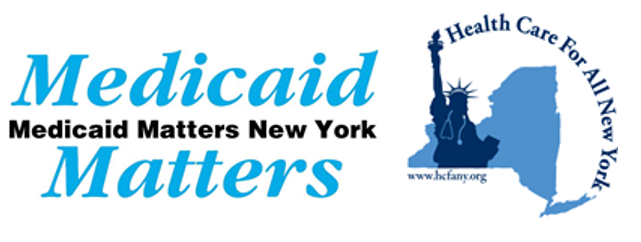Statement on the Adopted 2021-22 Health and Medicaid Budget
Posted April, 13 2021 by Amanda Dunker

Medicaid Matters New York and Health Care for All New York – the two major statewide health care consumer advocacy coalitions – applaud the State Legislature for several historic additions to the adopted state budget for 2021-22 related to funding for public schools and universities, rental and mortgage assistance, assistance to undocumented essential workers and small businesses, and taking some first steps toward restoring progressivity to the state’s tax system. Millions of low-income New Yorkers who rely on our state’s public health insurance programs will benefit from these improvements to the Governor’s initial set of budget proposals.
However, our State leaders failed to break ground in health care, which is disappointing in light of a decade of austerity budgets and the ongoing nature of the COVID-19 public health crisis. Medicaid Matters and HCFANY are specifically concerned about the following issues:
- The arbitrary Medicaid global spending cap was extended for another year. As a consequence, Medicaid continues to be approached with an austerity mindset. For ten years, Medicaid has suffered from unnecessary cuts, impacting access to services for low-income people, families, people with disabilities and communities.
- Public health insurance coverage was not expanded to low-income immigrants who have had COVID-19. Instead, those who are undocumented remain reliant solely on Emergency Medicaid for acute care and charity care programs for ongoing treatment. As a consequence, many will likely forego seeking necessary care, thereby prolonging illness and suffering, risking death, and incurring medical bills they cannot pay.
- The home care crisis and institutional bias remain unaddressed. Home care workers play a vital role in serving and protecting disabled New Yorkers and seniors living independently, a role that became even more critical and evident during the pandemic. However, New York’s failure to invest in home care has created a “worst in the nation” workforce crisis that prevents meaningful access to home care services for thousands of people and results in greater institutionalization.
- This is the first time in decades that New York State has adopted a discriminatory maternity coverage policy. Instead, only citizen and lawfully residing immigrant women will enroll in free (state-funded) Marketplace coverage after their Medicaid ends—continuing a system that allows for disruptions in care.
- No new initiatives were created to address inequities that are wide-spread throughout our state’s public health, health care, and health coverage systems, despite significant federal pandemic-related funds the state has received over the past year to address these disparities. The pandemic has revealed them clearly, and they can no longer be ignored.
On the positive side, we thank both the Governor and Legislature for these new initiatives:
- Eliminating all premiums in the state’s Essential Plan that provides insurance coverage to low-income people and families who are not eligible for Medicaid. This move will enable them to keep medical, dental, and vision coverage in place without financial barriers, an important step during the ongoing pandemic.
- Protecting the financial stability of community health centers and other safety net providers by delaying the implementation of the planned pharmacy carve-out from the state’s Medicaid Managed Care program.
We also acknowledge and appreciate restorations in funding cuts initially proposed by Governor Cuomo that made no sense given our ongoing pandemic:
- An across-the-board Medicaid rate cut that particularly threatened safety net hospitals that serve large numbers of Medicaid and uninsured patients.
- Elimination of Indigent Care Pool funding to public hospitals.
- Cuts to the state’s Vital Access Provider Assistance Program that keeps certain safety net and rural hospitals financially afloat.
- Additional cuts to Article VI public health funding to New York City.
- Allowing insurers to impose restrictions on the ability of doctors to prescribe certain drugs to Medicaid patients (elimination of the provision known as “prescriber prevails”).
- Another 25% cut to home care workforce recruitment and retention money that would have further harmed community-based long-term care.
- Cuts to programs serving adult home residents.
While as a whole and on the surface it may appear that New York continues to meet the needs of those enrolled in our state’s public health insurance programs and the providers they rely on, the 2021-22 adopted budget fails to make needed investments to turn away from austerity politics, protect all immigrants, expand community-based long-term care, and promote health equity. A lack of harm must not be confused with a budget that provides for what New Yorkers need. We can do better, and we must.
